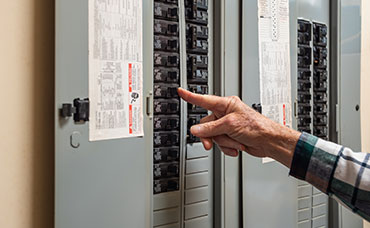When it comes to electrical systems, one term that often comes up is dedicated circuit. If you’re setting up a home office, adding major appliances, or just trying to understand your electrical system better, you may be wondering: what exactly is a dedicated circuit, and why might you need one?
In this guide, we’ll break down what a dedicated circuit is, why it’s important, and how it can benefit both your home and business. Whether you’re building a new home or upgrading your office, knowing how dedicated circuits work will help you create a safer, more efficient electrical setup.
What Is a Dedicated Circuit?
A dedicated circuit is an electrical circuit designed to supply power to a single appliance, device, or area. Unlike a general circuit, which powers multiple outlets and devices, a dedicated circuit is solely for one purpose. This type of circuit has its own breaker in the electrical panel, meaning it doesn’t share power with other devices.
Why Does Your Home Need a Dedicated Circuit?
There are several reasons why you might need a dedicated circuit in your home. Here are some of the most common scenarios:
1. High-Powered Appliances
Certain household appliances require more power than others. Items like:
- Refrigerators
- Ovens
- Microwaves
- Washing machines
- Dryers
These appliances use a lot of electricity and often need a dedicated circuit to ensure they can operate efficiently without causing an overload on the electrical system. A dedicated circuit can prevent your breaker from tripping or overheating when these high-powered appliances are in use.
2. Avoid Overloading Circuits
In a typical circuit, multiple devices share the same power supply, which can easily result in overloading the circuit. A dedicated circuit ensures that no other devices are connected to the same circuit, reducing the risk of overloading.
For example, if you plug a toaster and microwave into the same outlet on a shared circuit, both appliances might not have enough power to function correctly.
3. Safety
Dedicated circuits are also a safety measure. By isolating high-power appliances on their own circuits, you prevent the electrical system from becoming too strained, which can lead to short circuits, fires, or even electrical shocks. This is especially important for large appliances that draw a lot of electricity, such as water heaters and air conditioning units.
Why Does Your Business Need a Dedicated Circuit?
For businesses, particularly those that rely on high-powered equipment or multiple devices running at once, having dedicated circuits is essential for smooth operations. Here’s why:
1. Prevent Downtime and Disruptions
In a business setting, interruptions in power can be costly. Whether you’re running a restaurant with multiple kitchen appliances, an office with lots of computers, or a store with a high-volume cash register system, dedicated circuits can help prevent power issues. They ensure that if one device requires a lot of power, it won’t cause disruptions to the rest of your equipment.
2. Efficiency in Office and Industrial Settings
Businesses that rely on computers and other electronic devices benefit greatly from dedicated circuits. By setting up dedicated circuits for each device or group of devices (e.g., printers, copiers, computers), you ensure that the equipment can run without slowing down or causing power fluctuations in other areas of the business.
3. Compliance with Building Codes
In some cases, especially in commercial spaces, electrical codes may require the use of dedicated circuits. For example, office buildings and industrial sites may need separate circuits for certain equipment to comply with safety standards and regulations.
Hiring a licensed electrician to install dedicated circuits ensures your business remains in compliance with local laws.
When to Install a Dedicated Circuit in Your Home or Business
Now that you know why dedicated circuits are important, you might be wondering when and why you should install one. Here are some key scenarios:
1. New Appliances or Equipment
When installing new appliances or equipment that require a lot of power, a dedicated circuit is often required. This includes major home appliances like:
- Air conditioning units
- Electric ovens
- Refrigerators
- Washing machines
For businesses, any new high-powered equipment like servers, industrial machines, or large printers will need a dedicated circuit.
2. Renovations or Remodels
If you’re remodeling your home or business, it’s a good time to assess whether any of your existing devices require dedicated circuits. For instance, in a kitchen remodel, you may decide to install new appliances that demand more power. An electrician can install dedicated circuits to ensure everything operates safely.
3. Electrical Upgrades
If your home or business has an outdated electrical system, it may not be equipped to handle today’s power demands. Installing dedicated circuits can modernize your electrical setup, making it safer and more efficient.
4. Expanding Your Business
If your business is growing and you’re adding more equipment, it’s important to ensure that each new piece of equipment has its own dedicated circuit. This can improve efficiency and prevent power interruptions as your company expands.
How to Install a Dedicated Circuit
Installing a dedicated circuit requires expertise and knowledge of electrical systems. It’s always best to hire a licensed electrician for the job. Here’s a brief overview of what the installation process involves:
Determine the Power Requirements
The electrician will assess the power needs of the appliance or device that requires the dedicated circuit. This ensures that the circuit can handle the necessary load.
Circuit Breaker Installation
A dedicated circuit will be connected to its own breaker in the electrical panel. The electrician will install the appropriate size breaker based on the power requirements.
Running the Wiring
The electrician will then run a dedicated wire from the breaker to the outlet, ensuring that the wire is thick enough to handle the electrical load.
Testing and Inspection
Once the installation is complete, the electrician will test the circuit to ensure it’s working correctly and safely. In many cases, a local inspection may be required to ensure everything meets electrical codes.
Why a Dedicated Circuit Is Essential for Your Home or Business
A dedicated circuit is crucial for homes and businesses with high-power appliances or equipment. It ensures efficiency, safety, and prevents overloading. Whether you’re upgrading your electrical system or adding new devices, installing a dedicated circuit is a smart move.
Ready to install one? Don’t hesitate to reach out to the experts at Doc Watts Electric. Our team of licensed electricians can help assess your needs, install the right circuits, and ensure that your electrical system is safe and efficient!
Frequently Asked Questions (FAQs)
What is a Dedicated Circuit?
A dedicated circuit is an electrical circuit that serves only one appliance or device, ensuring it gets the power it needs without overloading the system.
When Do I Need a Dedicated Circuit in My Home or Business?
You need a dedicated circuit when installing high-powered appliances or equipment, such as refrigerators, air conditioners, or heavy-duty machinery, to avoid overloading shared circuits.
Can I Install a Dedicated Circuit Myself?
While it’s possible to install a dedicated circuit yourself, it’s always recommended to hire a licensed electrician. Electrical work can be dangerous and must comply with local codes for safety.
How Do I Know if My Home or Business Needs a Dedicated Circuit?
If your electrical appliances or equipment frequently trip breakers or cause power issues, it may be time to install a dedicated circuit. Consult an electrician to assess your needs.

